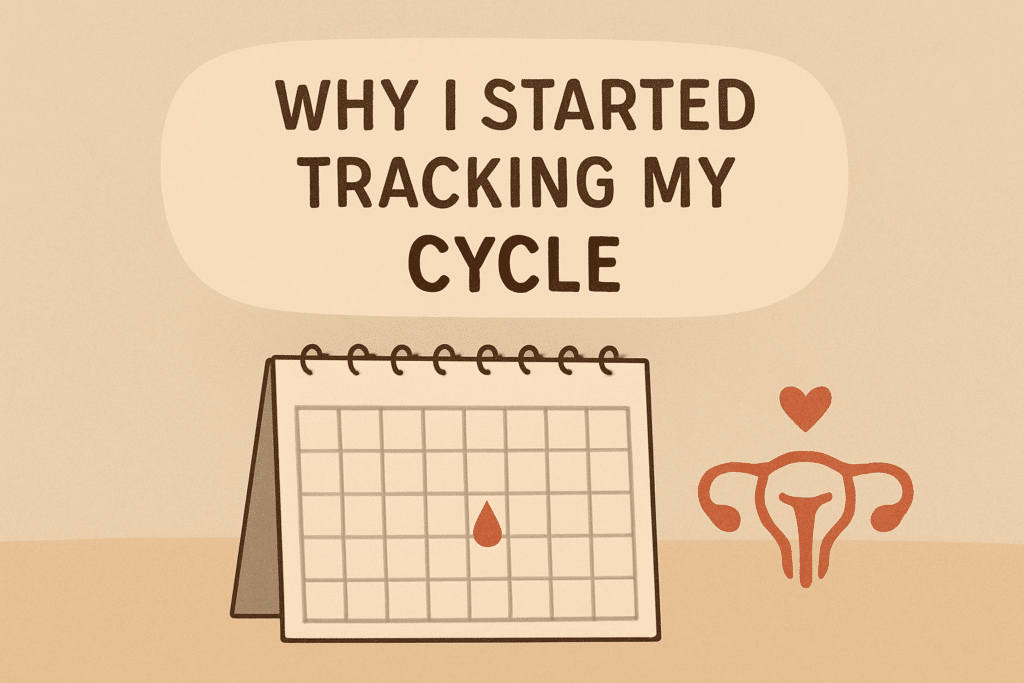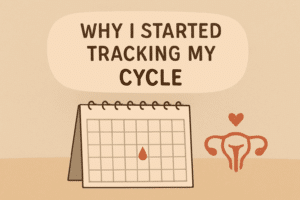My name is Pranitha, and I’m happy to inform that I’ve joined the 28ish Team this past summer of 2025. There are so many aspects of 28ish’s mission that resonated with me, including understanding my habits around cycle-tracking and normalizing conversations around cycle-related health for others. I hope this series of entries will give you insights into my own experiences with cycle-tracking and what I’ve discovered while on this journey.
It started with a single note in my planner: “tired today.”
The week leading up to my period, I would start experiencing intense emotional shifts. It was a concoction of sadness that doesn’t relate to any particular event and the need to cry without a clear cause.
I look at my to-do list and feel unmotivated to do anything but just look at it. It’s like an all-consuming storm cloud that follows me around to school, to work, to bed … and just days later, I look back and wonder, “What was that?”
I started looking for answers. What if I start tracking, not just when my period starts and ends, but how I’m feeling each day, emotionally, physically, and mentally. It’s slow progress as I wait through the month to find what emerges. Right after ovulation and leading into the next period, the same feelings and symptoms returned.
Of course, it’s the luteal phase. It’s characterized by a sharp increase in the hormone progesterone. For some people, progesterone has a calming effect but for others, it triggers the opposite [1].
Progesterone is converted in the brain into compounds like allopregnanolone, which interact with the same receptors targeted by anti-anxiety medications. If that system is off balance, whether it be due to stress, nutritional deficiencies, or sensitivity, the effects can feel like anxiety, depression, or a combination of both [2,3].
What makes everything worse is stress. An upcoming deadline at work or working through midterms and final exams, there is this constant bout of low-grade stress. It builds and builds, becoming “chronic,” like an unwelcome house guest that doesn’t know to leave [4].
Stress means elevated cortisol, the body’s long-haul “survival” hormone. High cortisol can amplify the emotional effects of progesterone, disrupt neurotransmitter balance in the brain, and deplete the nutrients that protect energy and mood [3,4].
I continue to track my cycle more consistently, noting not just dates of my period but also mood, sleep, energy, and stress levels. Somedays I forget to, but it’s the habits that I’m building that are more important. I adjust my diet to include more hormone-supportive foods like leafy greens, vegetables, fiber, flax and chia seeds, and magnesium-rich options like tofu and pumpkin seeds [5,6,7]. I realized that an afternoon cup of green tea or matcha, rich in L-theanine, relaxes my mind as I head into your evening [8]. And I started moving more, matching energy levels for the day, whether it be an intense run or just some gentle stretching [9]. I started to make sure I have some screen-free time before bed to protect my sleep.
Tracking my cycle has not just become a tool. It’s a relationship. It’s how I’ve learned to listen to my body instead of feeling like I’m fighting it. Our bodies can be dramatic, but they are simply trying to communicate. Anticipating these shifts has helped me prepare but also hone into the superpowers that come with each phase of my cycle.
Let’s finally be on the same team as our cycles and bodies.
– Pranitha, 28ish
References
- Bernal, A., & Paolieri, D. (2022). The influence of estradiol and progesterone on neurocognition during three phases of the menstrual cycle: Modulating factors. Behavioural Brain Research, 417, 113593. https://doi.org/10.1016/j.bbr.2021.113593.
- Bernal, A., & Paolieri, D. (2022). The influence of estradiol and progesterone on neurocognition during three phases of the menstrual cycle: Modulating factors. Behavioural Brain Research, 417, 113593. https://doi.org/10.1016/j.bbr.2021.113593.
- Bencker, C., Gschwandtner, L., Nayman, S., Grikšienė, R., Nguyen, B., Nater, U. M., Guennoun, R., Sundström-Poromaa, I., Pletzer, B., Bixo, M., & Comasco, E. (2025). Progestagens and progesterone receptor modulation: Effects on the brain, mood, stress, and cognition in females. Frontiers in Neuroendocrinology, 76, 101160. https://doi.org/10.1016/j.yfrne.2024.101160.
- Schweizer-Schubert, S., Gordon, J. L., Eisenlohr-Moul, T. A., Meltzer-Brody, S., Schmalenberger, K. M., Slopien, R., Zietlow, A.-L., Ehlert, U., & Ditzen, B. (2021). Steroid Hormone Sensitivity in Reproductive Mood Disorders: On the Role of the GABAA Receptor Complex and Stress During Hormonal Transitions. Frontiers in Medicine, 7. https://doi.org/10.3389/fmed.2020.479646.
- Athar, F., Karmani, M., & Templeman, N. M. (2024). Metabolic hormones are integral regulators of female reproductive health and function. Bioscience Reports, 44(1), BSR20231916. https://doi.org/10.1042/BSR20231916.
- Kudesia, R., Alexander, M., Gulati, M., Kennard, A., & Tollefson, M. (2021). Dietary Approaches to Women’s Sexual and Reproductive Health. American Journal of Lifestyle Medicine, 15(4), 414–424. https://doi.org/10.1177/15598276211007113.
- Porri, D., Biesalski, H. K., Limitone, A., Bertuzzo, L., & Cena, H. (2021). Effect of magnesium supplementation on women’s health and well-being. NFS Journal, 23, 30–36. https://doi.org/10.1016/j.nfs.2021.03.003.
- Wang, L., Brennan, M., Li, S., Zhao, H., Lange, K. W., & Brennan, C. (2022). How does the tea L-theanine buffer stress and anxiety. Food Science and Human Wellness, 11(3), 467–475. https://doi.org/10.1016/j.fshw.2021.12.004.
- Rocha-Rodrigues, S., Sousa, M., Lourenço Reis, P., Leão, C., Cardoso-Marinho, B., Massada, M., & Afonso, J. (2021). Bidirectional Interactions between the Menstrual Cycle, Exercise Training, and Macronutrient Intake in Women: A Review. Nutrients, 13(2), 438. https://doi.org/10.3390/nu13020438.





